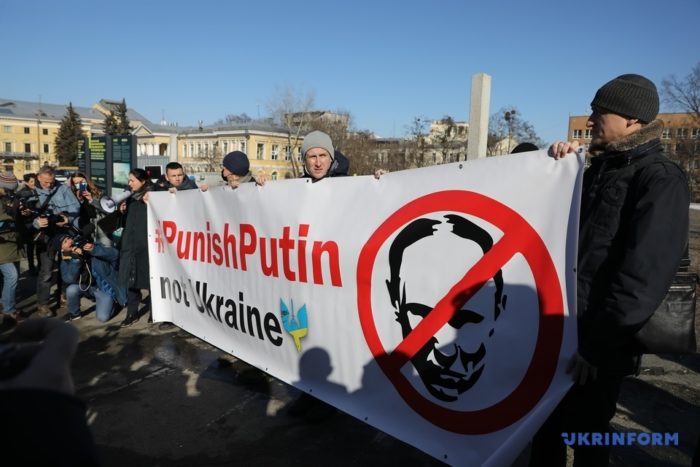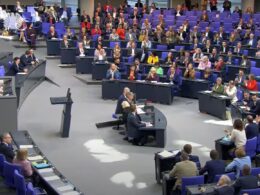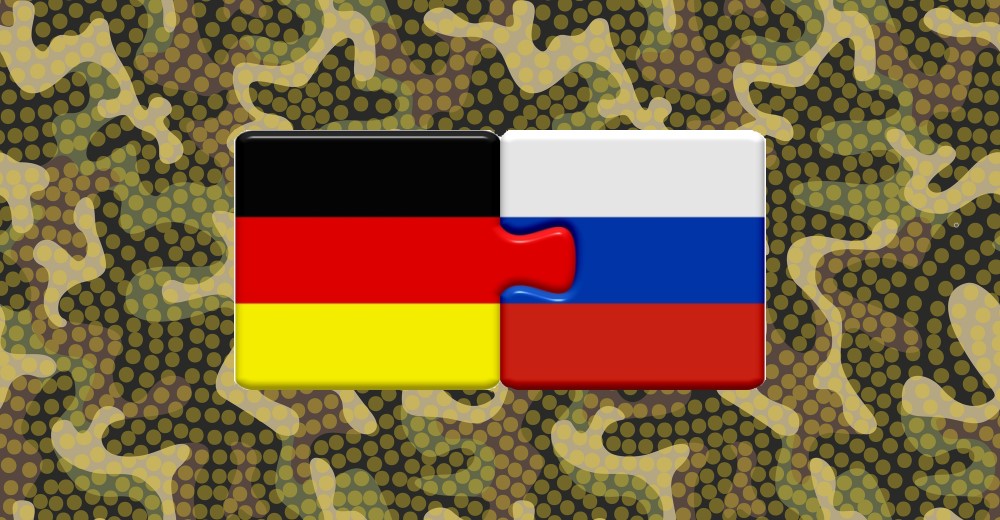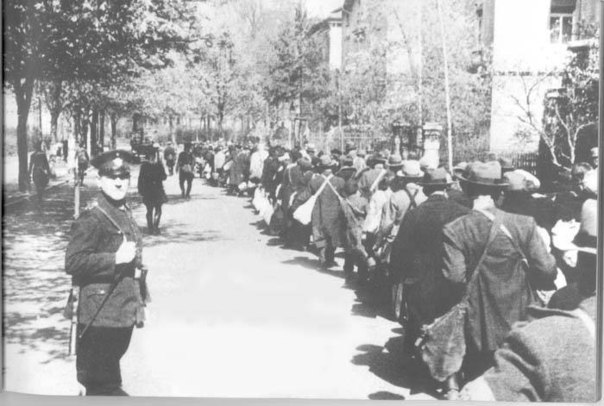As German Chancellor Olaf Scholz arrived for talks with President Zelenskyy ahead of a trip to Moscow, he was met by activists demanding to sanction Russian agents in Germany. The list includes superyachts of Vladimir Putin and his entourage stationed and serviced in Germany, Vladimir Yakunin, who runs the Dialogue of Civilizations Institute, Deutsche Bank, and German former political elite serving at boards of Russian state companies, including from Scholz's own political party, the SPD,
Scholz’s visit comes amid fears of a Russian escalation as Germany called upon its citizens to leave Ukraine and the German embassy cut down staff and relocated its Dnipro-based consulate to the west-Ukrainian city of Lviv.
Participants of a picket organized by the Capitulation Resistance Movement and Network for Protecting National Interests (ANTS) call upon German Chancellor Scholz to impose sanctions against lobbyists of Russian interests in Germany. Photos: Ukrinform.net
The organizers of the picket called upon Scholz to:
- refrain from pressuring Ukraine to implement the Minsk agreements, controversial documents signed in 2015 that seek to regulate the Russian-Ukrainian war on conditions Ukrainian critics say are beneficial to the Kremlin;
- stop Nord Stream 2, a controversial pipeline by which Russia’s gas shipments to Germany, bypassing Ukraine’s gas transport system;
- to not hold talks with Russia until all Ukrainian citizens illegally detained in Russia or occupied Donbas are released;
- bar Putin’s entourage and their families from entering Europe.
- sanction Russian agents and lobbyists of Russian interests in Germany.
Daria Kaleniuk, executive director at the Anti-Corruption Action Center, a prominent Ukrainian corruption watchdog, shared some helpful information about who these lobbyists of Russian interests – and their assets – might be.

“Germany is a shipyard for Putin and his inner circle. Meet Megayacht Dilbar of Alisher Usmanov, an oligarch with a net worth $17.5 bn. German company Lurssen produced this masterpiece and docks it,” Kaleniuk tweeted.

“Oleg Deripaska, net worth $4.6 bn, also needs services of German Lurssen shipyard for his Clio yacht,” Kaleniuk continued.

Kaleniuk also mentioned the 162 metre-Eclipse Megayacht of Roman Abramovich, whose net worth is $13.5 bn. This most expensive private Megayacht in the world, with a cost of $1.2 bln, was produced by German Blohm+Voss with a port in Hamburg.
As well, there is Russian President Vladimir Putin’s personal yacht Graceful, which a week ago was fleeing from the same port in Hamburg maintained by Blohm+Voss.
Kaleniuk also named Vladimir Yakunin, Putia a personal friend of Putin who lives in Germany and influences public opinion there through a Berlin branch of the Dialogue of Civilizations Research Institute and the German-Russian Forum.
“Yakunin once headed the Russian state railway company; the team of now-jailed opposition politician Alexei Navalny did an investigation on his wealth,” Kaleniuk reminded.
She listed the German former political elite serving at boards of Russian state companies:
- Gerhard Schröder, the former head of Chancellor Scholz’s SPD party and former Federal Chancellor. In February, he was nominated to join the supervisory board of Russian state-owned energy giant Gazprom.
- Marion Scheller, ex-head Federal Chancellory, who was appointed in 2016 as “Senior Advisor for Governmental Relations” at Nord Stream 2
- Hartmut Mehdorn, ex-CEO of German railway company Deutsche Bahn, now Member of the Board of Directors of Russian Railways;
- Matthias Warnig, a former officer in the Stasi, who is CEO of Nord Stream AG a company for the construction and operation of Nord Stream 2.
Kaleniuk also listed Deutsche Bank, frequently used to launder dirty money from the Russian corrupt elite, whose activities were exposed by the Organized Crime and Corruption Reporting Project in the investigation “The Russian laundromat exposed.”
Russian money is also used to sponsor the German far-right political party AfD and the German companies Siemens and Lufthansa don’t mind having business with occupied Crimea, Kaleniuk reminds.
In 2017, four turbines produced by the German technogiant Siemens were delivered to freshly-constructed power stations in Crimea, the Ukrainian peninsula which Russia occupied in 2014. Siemens’ management claimed that they were duped by their Russian partners, yet an investigation by Euromaidan Press showed that they couldn’t have not known where the turbines were going.
As well, in a recent report, the German Welt am Sonntag uncovered surprisingly large-scale German exports of so-called dual-use products (of both military and civilian use) to Russia despite EU sanctions, facilitating Russian militarism and aggression against the peoples of Ukraine, Chechnya, Georgia, Moldova, Syria, and other countries.
Moreover, late last year, the German newspaper Tagesschau published a piece about a Conflict Armament Research Ltd. investigation that uncovered the use of advanced German technology in Russian battlefield unmanned aerial vehicles used by the Russian military forces in the occupied Donbas against Ukrainian defenders.
Despite this, Germany is refusing to supply Ukraine with defensive arms, as Chancellor Scholz reiterated during his visit.
Related:
- How Siemens chose to ignore the obvious. An investigation into the Crimean sanctions break
- Gas, money laundering, and pizza: report details Russia’s economic meddling in Europe
- NGO Institute for Security Policy, Austrian Ministry of Defense, and Valdai-Club: Case study on Russian influence in Central Europe










